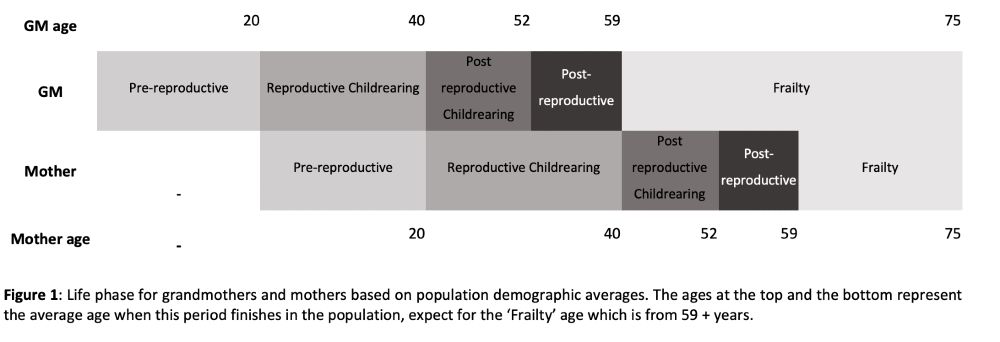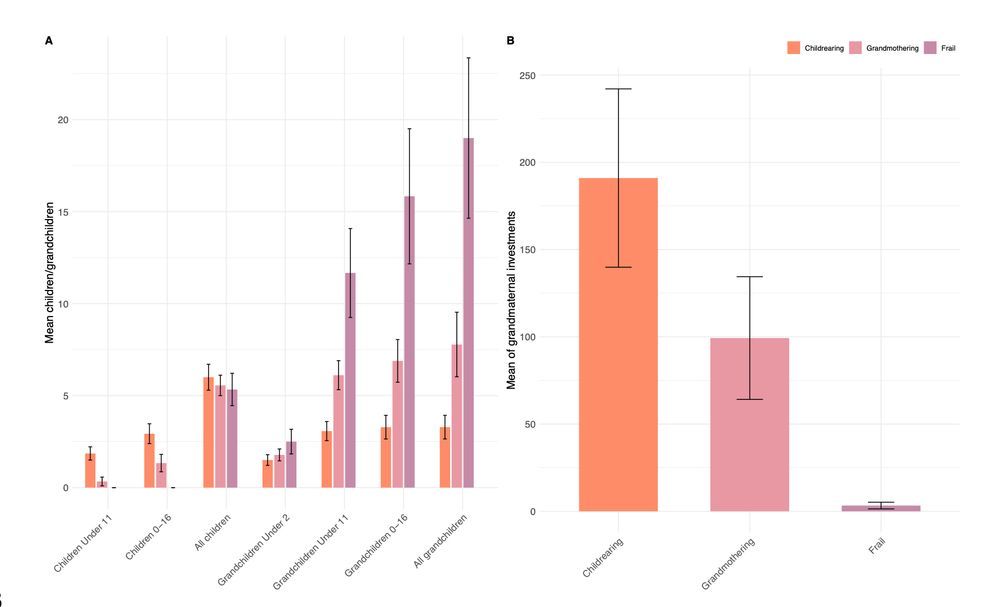
1) Age < investment a lot while grandkids >
2) More dependent children = less care per grandchild
3) More grandchildren = less care per grandchild esp the younger grandkids under 2 years
Support is diluted, not absent - but heavily constrained by demographics


1) Age < investment a lot while grandkids >
2) More dependent children = less care per grandchild
3) More grandchildren = less care per grandchild esp the younger grandkids under 2 years
Support is diluted, not absent - but heavily constrained by demographics

High fertility rates (TFR = 7.7) mean Agta grandmothers can have up to 30 grandkids, creating competition 👶
More grandchildren = less investment per child 📉
Our models showed that grandmothers with more young grandkids decreased investment by up to 34%

High fertility rates (TFR = 7.7) mean Agta grandmothers can have up to 30 grandkids, creating competition 👶
More grandchildren = less investment per child 📉
Our models showed that grandmothers with more young grandkids decreased investment by up to 34%
the "helping window" from grandmothering is short = on average just 7 years ⬇️
But these fully ‘post reproductive’ grandmothers still did less childcare – why?

the "helping window" from grandmothering is short = on average just 7 years ⬇️
But these fully ‘post reproductive’ grandmothers still did less childcare – why?
Given high mortality rates many grandmothers were dead (~45-55% kids had dead grandmothers) and after the age of 60 face poor health which limits investment ☠️
Grandmothers aged over 60 did basically no childcare!

Given high mortality rates many grandmothers were dead (~45-55% kids had dead grandmothers) and after the age of 60 face poor health which limits investment ☠️
Grandmothers aged over 60 did basically no childcare!


Most cultures prefer polygyny but most people marry monogamously!

Most cultures prefer polygyny but most people marry monogamously!
its important to us that women who give up their time get sometime back from the app - they value it to and we will keep working on this with more feedback mechanisms

its important to us that women who give up their time get sometime back from the app - they value it to and we will keep working on this with more feedback mechanisms
Daily reporting was akin to journalling 📖, helping women reflect and acknowledge their progress and when they needed help

Daily reporting was akin to journalling 📖, helping women reflect and acknowledge their progress and when they needed help

we ask a bunch of questions months or even *years* later about things WHICH CHANGE ALL THE TIME

we ask a bunch of questions months or even *years* later about things WHICH CHANGE ALL THE TIME

We have moderate evidence that more foraging was associated with lower fertility (plot A) while increases in farming (plot B-D) strongly associated with increased fertility but as you can see the trends are not consistent in all populations

We have moderate evidence that more foraging was associated with lower fertility (plot A) while increases in farming (plot B-D) strongly associated with increased fertility but as you can see the trends are not consistent in all populations


Here we see that women - to varying degrees - engaged it a wide range of economic activities not necessarily aligned with their 'type'

Here we see that women - to varying degrees - engaged it a wide range of economic activities not necessarily aligned with their 'type'
Department of Evolutionary Anthropology as Assistant Professor in "Paleoanthropology" with
Apply until 3rd December 2023 via mnf.uzh.ch/paleoanthro! #bioanth#paleontology #professorship

Department of Evolutionary Anthropology as Assistant Professor in "Paleoanthropology" with
Apply until 3rd December 2023 via mnf.uzh.ch/paleoanthro! #bioanth#paleontology #professorship
Assistant Professor (tenure track) Biological Anthropology, University of Alberta
t.co/4kTaTaSJN3

Assistant Professor (tenure track) Biological Anthropology, University of Alberta
t.co/4kTaTaSJN3
They are looking for contributors for a special issue on mental health from anthropological perspectives
#bioanth #CulturalEvolution

They are looking for contributors for a special issue on mental health from anthropological perspectives
#bioanth #CulturalEvolution

💙💙💙💙

💙💙💙💙

